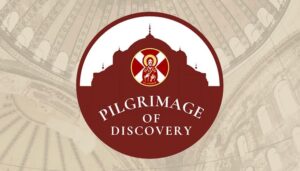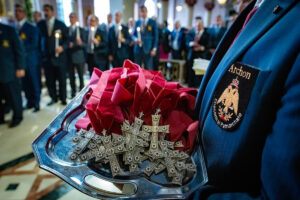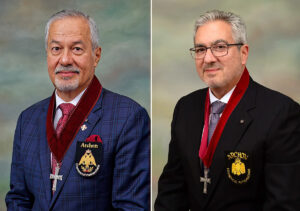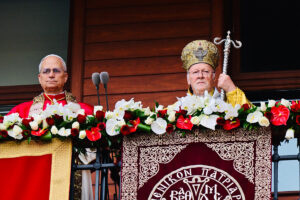On Sunday, June 1, 2025, His All-Holiness Ecumenical Patriarch Bartholomew issued a Patriarchal and Synodal Encyclical, addressed to the plenitude of the Church, explaining the enduring and pivotal importance of the First Ecumenical Council, which was held in Nicaea in 325 A.D. In his significant new exposition of this event of cardinal importance for the Orthodox Christian Faith, His All-Holiness emphasizes the teachings of the Sacred Council on the synodal structure of the Church, the date of Pascha, and more.
The Ecumenical Patriarch begins by stating: “We offer a hymn of thanks to the almighty, all-seeing, and benevolent God in Trinity.” This was altogether fitting, as the Council of Nicaea played a central role in clarifying the Church’s understanding of the Triune God, as it formulated the Creed that is still recited in Churches throughout the world during every Divine Liturgy, and that acknowledges our sacred belief in “God, Father Almighty, Creator of heaven and earth, and of all things visible and invisible, and in one Lord Jesus Christ, the only-begotten Son of God, begotten of the Father before all ages; Light of Light, true God of true God,” and in the Holy Spirit.
His All-Holiness then points out that the Sacred Council “bore spiritual witness to the authentic faith in divine Word born without beginning and truly consubstantial with the Father.” He explains that “in the face of the Arian heresy,” which denied the divinity and eternal existence of Christ, the Council of Nicaea “formulated the essence of its faith,” namely, “the pre-eternal Son and Word of God, ‘consubstantial to the Father . . . true God of true God,’ through His incarnation, saves humankind from enslavement to the enemy and opens up to us the way of deification through grace.”
A principal focus of the Ecumenical Patriarch’s Patriarchal and Synodal Encyclical is the fact that, as he explains, the Council of Nicaea “constitutes an expression of the synodal nature of the Church,” and also “signifies the emergence of a new conciliar structure, namely of Ecumenical Councils that would prove definitive for the development of church affairs,” and would be convened not on a regular basis, but as needed in the life of the Church in order to clarify central issues of the Faith and restored ruptured Communion between Orthodox Churches.
His All-Holiness explains that although the Emperor Constantine the Great convened the Council of Nicaea, “attended its deliberations and embraced its decisions with the status of imperial law,” this does not mean that the Sacred Council was a political or imperial convocation. “It was,” His All-Holiness states, “an unquestionably ‘ecclesiastical event’ whereby the Church, guided by the Holy Spirit, decided about its internal affairs, while the Emperor implemented the principle ‘Render unto Caesar the things that belong to Caesar and to God the things that belong to God’ (Mt. 22:21).”
His All-Holiness reminds us that the Council of Nicaea was not a mere human gathering: “Athanasius the Great mentions that the Synodal Fathers ‘on matters of faith, do not write “It seemed to us . . .” but rather “This is what the catholic Church believes; and at once they confessed what they believe, in order to demonstrate that nothing novel was discovered in what they wrote, but that their mindset is apostolic, in other words exactly as the Apostles had taught.’”
The Ecumenical Patriarch adds: “The conviction of the divinely-instructed Fathers was that nothing was added to the faith of the Apostles and that the truly ecumenical Symbol of Nicaea comprises a proclamation of the common tradition of the catholic Church.” The Church always believed what the Council of Nicaea taught; the Council gave us its enduringly clear and precise exposition and formulation.
His All-Holiness also notes that the Council of Nicaea resolved “when and how we should celebrate the Feast of Pascha.” He stated: “The 1700th anniversary of the convening of this Council has brought back the timeliness of the matter of a common celebration of the Lord’s Resurrection. The Holy Great Church of Christ prays that Christians all over the world will return, in accordance with the decrees of the Council of Nicaea, to a celebration of Easter on a common day, as by a blessed coincidence this current year.”
“The Ecumenical Throne of Constantinople,” the Ecumenical Patriarch writes, “has perennially served as the guarantor of the decisions of Nicaea.” This Sacred Council remains “a milestone in the formation of the doctrinal identity and canonical structure of the Church,” and continues to be “the model for handling problems of faith and canonical order on an ecumenical level.” He states that “the 1700th anniversary since its convening reminds Christianity of the traditions of the ancient Church, the value of mutual struggle against misconceptions of the Christian faith, and the mission of the faithful to contribute to the multiplication of the ‘good fruits’ of the life in Christ, according to Christ, and directed toward Christ in the world.”
As such, says the Ecumenical Patriarch, “reference to the ‘spirit of Nicaea’ presents an invitation for us to turn to the essential aspects of our faith, the nucleus of which is the salvation of humankind in Christ.”
As Archons of the Ecumenical Patriarchate, let us redouble our efforts to manifest that spirit of Nicaea in the contemporary world.
Read the whole of His All-Holiness’ Patriarchal and Synodal Encyclical Marking the 1700th Anniversary of the Council of Nicaea here.






